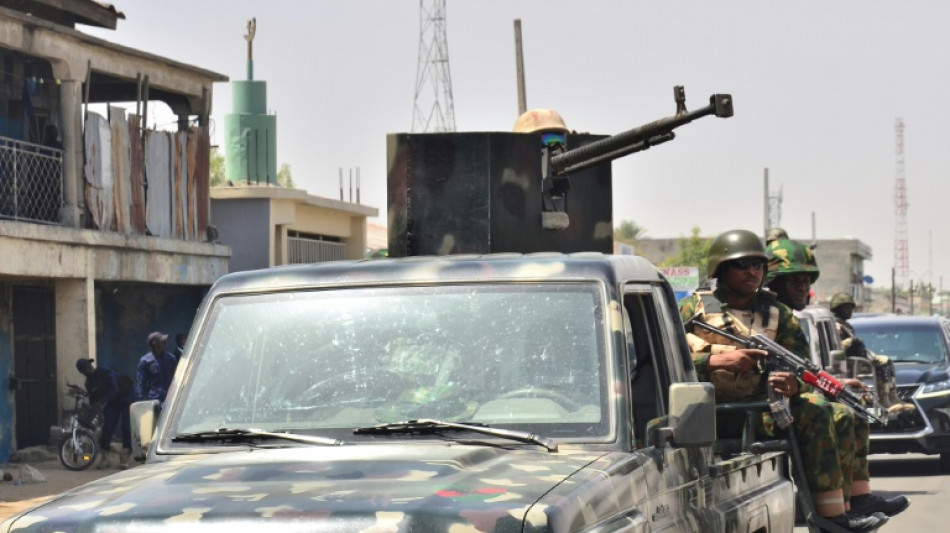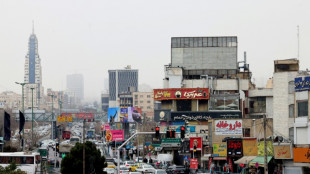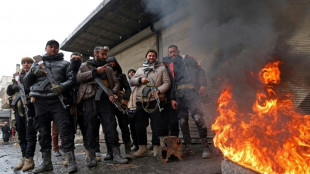
-
 Louvre heist probe: What we know
Louvre heist probe: What we know
-
Surging billionaire wealth a political threat, Oxfam warns as Davos opens

-
 Morocco fans stunned, disappointed as Senegal win Africa title
Morocco fans stunned, disappointed as Senegal win Africa title
-
Senegal fuelled by 'injustice' in AFCON final triumph, says hero Gueye

-
 Morocco coach Regragui laments 'shameful' scenes in AFCON final defeat
Morocco coach Regragui laments 'shameful' scenes in AFCON final defeat
-
Maye, Boutte wonder-catch carry Patriots past Texans

-
 Train collision in Spain kills 21, injures dozens
Train collision in Spain kills 21, injures dozens
-
Brazilians Abner, Endrick help Lyon climb to 4th in Ligue 1

-
 Barca beaten at Real Sociedad as Liga title race tightens
Barca beaten at Real Sociedad as Liga title race tightens
-
Socialist to face far-right candidate for Portugal's presidency

-
 Senegal stun hosts Morocco to win AFCON title after final walk-off protest
Senegal stun hosts Morocco to win AFCON title after final walk-off protest
-
Syria's leader agrees truce with Kurds after govt troops advance

-
 Morant shines as Grizzlies top Magic in London
Morant shines as Grizzlies top Magic in London
-
Real Sociedad end Barca winning streak to tighten Liga title race

-
 Senegal stun hosts Morocco to win AFCON title after ugly scenes mar final
Senegal stun hosts Morocco to win AFCON title after ugly scenes mar final
-
AC Milan in touch with Inter thanks to Fullkrug's first Serie A goal

-
 Lyon climb to fourth in Ligue 1 with victory over Brest
Lyon climb to fourth in Ligue 1 with victory over Brest
-
Morant shines as Grizzles top Magic in London

-
 Trump admin orders 1,500 troops to prepare for possible Minnesota deployment
Trump admin orders 1,500 troops to prepare for possible Minnesota deployment
-
Limited internet briefly returns in Iran after protest blackout

-
 South Africa declares national disaster as floods batter region
South Africa declares national disaster as floods batter region
-
Gang members in Guatemala kill seven police after prison crackdown: minister

-
 Villa's title bid rocked by Everton loss, Newcastle held at Wolves
Villa's title bid rocked by Everton loss, Newcastle held at Wolves
-
Dybala boosts Roma's Champions League hopes, Fiorentina honour Commisso

-
 Villa's title bid rocked by Everton loss, Newcastle held by Wolves
Villa's title bid rocked by Everton loss, Newcastle held by Wolves
-
'Avatar: Fire and Ash' at number one in N.America for fifth straight week

-
 Limited internet returns in Iran after protest blackout
Limited internet returns in Iran after protest blackout
-
Syria's leader agrees truce deal with Kurds after govt troops advance

-
 Smith's penalty sees Quins eliminate La Rochelle, Bordeaux secure top seeding
Smith's penalty sees Quins eliminate La Rochelle, Bordeaux secure top seeding
-
Atletico edge Alaves to strengthen Liga top-four hold

-
 Uganda president says opposition 'terrorists' in victory speech
Uganda president says opposition 'terrorists' in victory speech
-
New Zealand register first ODI series win in India despite Kohli ton

-
 Elvira wins Dubai Invitational after Lowry's last hole meltdown
Elvira wins Dubai Invitational after Lowry's last hole meltdown
-
Jeong snatches Union late draw at Stuttgart in Bundesliga

-
 Man Utd's Martinez hits back at Scholes after height jibes
Man Utd's Martinez hits back at Scholes after height jibes
-
Frank on the brink as Romero calls for unity amid Spurs 'disaster'

-
 Chile declares emergency as wildfires kill at least 15
Chile declares emergency as wildfires kill at least 15
-
Europe hits back at Trump tariff threat over Greenland

-
 Men's Fashion Week in Paris: what to watch
Men's Fashion Week in Paris: what to watch
-
McGrath goes top of slalom standings with Wengen win

-
 No Venus fairytale as Alcaraz, Sabalenka win Melbourne openers
No Venus fairytale as Alcaraz, Sabalenka win Melbourne openers
-
Iran considers 'gradually' restoring internet after shutdown

-
 Mitchell, Phillips tons guide New Zealand to 337-8 in ODI decider
Mitchell, Phillips tons guide New Zealand to 337-8 in ODI decider
-
Flailing Frankfurt sack coach Toppmoeller

-
 Kurdish forces withdraw from Syria's largest oil field as govt forces advance
Kurdish forces withdraw from Syria's largest oil field as govt forces advance
-
'Proud' Venus Williams, 45, exits Australian Open after epic battle

-
 Vonn in Olympic form with another World Cup podium in Tarvisio super-G
Vonn in Olympic form with another World Cup podium in Tarvisio super-G
-
Alcaraz kicks off career Grand Slam bid with tough Australian Open test

-
 Hosts Morocco face Mane's Senegal for AFCON glory
Hosts Morocco face Mane's Senegal for AFCON glory
-
Europe scrambles to respond to Trump tariff threat


Nigeria, Sahel militants embrace DIY drone warfare
Under the cover of darkness, the jihadists moved into Wulgo, where the shores of Lake Chad meet the arid countryside of northern Nigeria.
Around 1:00 am, a "barrage" of rocket-propelled grenades was fired, sending Cameroonian troops, stationed there as part of an anti-jihadist coalition, into "disarray", a security source told AFP.
While the militants had disguised themselves in a nearby town as herders coming into the weekly market, they also might have had another advantage, according to an intelligence report seen by AFP: the use of armed drones.
The Tuesday morning attack, which sources said killed 25 Cameroonian troops in one of the region's deadliest incidents in recent months, comes as armed groups in west Africa turn towards the use of cheap, recreational drones -- modified into deadly, explosives-laden killers from above.
Armed groups in Nigeria and the Sahel have long used drones for surveillance and filming propaganda, but a shift is under way as jihadists and separatists kit them out for attacks.
"It's an available, at-reach technology, and it's easier and easier to use, and it's cheaper and cheaper," Wassim Nasr, researcher at the Soufan Center and journalist at France24, said. "It was only a matter of time before it arrived into the Sahel region and Nigeria."
In a major three-day battle in Mali in July, Tuareg separatists used drones against Russian paramilitary and Malian armed forces, analysts observed. In February, the rebels said they used a drone to down an army helicopter, though the military disputed the incident.
Meanwhile, jihadist groups in Mali and Burkina Faso have claimed to use drones equipped to drop grenades from above, as well as explosive-laden "suicide drones" that crash into targets, according to conflict analysis group WAMAPS.
Late last year, a drone attack wounded five soldiers at Nigeria's Wajirko base, in the northeast, battered from years of insurgency from Boko Haram and Islamic State West Africa Province (ISWAP) fighters.
In January, soldiers at another base shot down drones hovering above them.
The South Africa-based Institute for Security Studies recently warned that "use of armed drones in battlefield operations is a dangerous new phase in ISWAP's insurgency".
In a sign of the military's own caution, drones were banned in northeast Nigeria in December.
- 'Spreading around the Sahel' -
Charlie Werb, an analyst with Alert:24, a risk consultancy, said over the past year he had noticed an increase in claims and reports of jihadists in the Sahel using drones, with a noted uptick since January.
"It's a pretty stark contrast," he told AFP.
"Every week or month this year, I've seen evidence of these drones spreading around the Sahel," he said, though he added that their use had been inconsistent and at times "rudimentary".
Nasr warned against drones being labelled a "game changer", adding that having a drone available "does not mean it will be properly used".
The continued reluctance of some jihadist groups to modify their surveillance drones for attack purposes, he added, suggests that drones are still relatively difficult to come by in the region, even as globalisation has eased their spread.
- Shifting skies -
For those on the receiving end, however, the drones have become a deadly addition to the militants' arsenals.
"The destruction on the base is massive. It is completely burnt along with military vehicles," said Muhammad Sani Umar, a nearby resident who visited the site of the Wulgo attack.
The incident was claimed by the Islamic State group, though local sources suggested Boko Haram might have been responsible based on their observations of the suspected militants.
The Nigerian military did not respond to requests for comment. The Cameroonian military said 12 of its soldiers were killed.
The use of drones by jihadists and separatists also heralds a shift in the air dominance by regional militaries -- which was itself marked by hundreds of civilian deaths at the hand of military-grade UAVs, notably in Mali, Burkina Faso and Nigeria.
As the skies above shift, Burkina junta leader Ibrahim Traore has been spotted at public events with a security detail that includes soldiers with anti-drone equipment, Werb noted.
But deficits remain: Major General Godwin Mutkut, who heads a multi-national coalition fighting jihadists in the Lake Chad region, noted at a coalition gathering in January that there was a general lack of anti-drone equipment among member countries.
That could pose problems if militants in the region -- largely confined to the countryside in recent years -- make renewed attempts to push into cities, where drones would potentially be "a core component... to changing their level of threat," Werb said.
H.Gerber--VB




